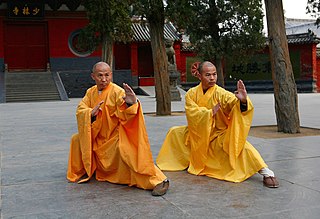
Zhàozhōu Cōngshěn (778–897) was a Chán (Zen) Buddhist master especially known for his "paradoxical statements and strange deeds".

Nanquan refers to a classification of Chinese martial arts that originated south of the Yangtze River of China around late Ming dynasty and early Qing dynasty.
Wushu was contested by both men and women at the 2006 Asian Games in Doha, Qatar from December 11 to December 14, 2006. It was competed in the disciplines of Taijiquan, Taijijian, Changquan, Daoshu, Jianshu, Gunshu, Qiangshu, Nanquan, Nangun, Nandao, and Sanshou. All events were held at Aspire Hall 3.
Wushu was both a men's and women's event at the 2009 Southeast Asian Games in Vientianne, Laos held from December 13 to December 17, 2009.
Wushu was contested by both men and women at the 1998 Asian Games in Bangkok, Thailand from December 16 to December 19, 1998. It was competed in the disciplines of Taijiquan, Changquan, Nanquan and Sanda. All events were held at Thammasat Gymnasium 6. Changquan event consisted of Changquan, one long weapon discipline and one short weapon discipline.
The men's nanquan three events combined competition at the 2002 Asian Games in Busan, South Korea was held from 10 to 13 October at the Dongseo University Minseok Sports Center.
The men's nanquan three events combined competition at the 2006 Asian Games in Doha, Qatar was held from 11 to 14 December at the Aspire Hall 3.
The men's Nanquan / Nangun all-round competition at the 2014 Asian Games in Incheon, South Korea was held on 22 September at the Ganghwa Dolmens Gymnasium.
Huang Junhua is a professional wushu taolu athlete from Macau. He is a two-time world champion and the second ever gold medallist for Macau at the Asian Games.
Phạm Quốc Khánh is a Vietnamese male wushu practitioner.

Nanquan Temple is a Buddhist temple located in Xiangyin County, Hunan, China.
The men's nanquan / nangun all-around competition at the 2008 Beijing Wushu Tournament was held from August 21 to 22 at the Olympic Sports Center Gymnasium.
The women's nanquan / nangun all-around competition at the 2008 Beijing Wushu Tournament was held from August 21 to 22 at the Olympic Sports Center Gymnasium.
Willy Reyes Wang is a former competitive wushu taolu athlete from the Philippines. He is one of the most decorated Filipino wushu athletes of all time in international competition and became especially renowned after his gold medal victory at the 2008 Beijing Wushu Tournament.
Ng Siu Ching is a former wushu taolu athlete from Hong Kong. She achieved an extensive medal record in international competition, becoming the first taolu athlete to win five gold medals at the World Wushu Championships. Ng also had multiple victories in the Asian Games and the East Asian Games.
He Jing De is a former competitive wushu taolu athlete and stuntman originally from China. He was a member of the Beijing Wushu Team, an original member of Cirque du Soleil's KA, and a renowned athlete representing Hong Kong. He is a two-time world champion and medalist at the Asian Games and the East Asian Games, and is especially remembered for his unique wushu style.
Diana Bong Siong Lin is a Malaysian wushu taolu and coach. She won the bronze at the 2008 Beijing Wushu Tournament, that was held in tandem with the 2008 Summer Olympics, in the women's nanquan event. At the 2006 Asian Games she won the bronze medal also in the nanquan event. At the World Wushu Championships she won became nandao world champion at 2013 World Wushu Championships and won furthermore fourd silver medals and two bronze medals. At the 2013 World Games she won the bronze medal.
He Qiang is a retired professional wushu taolu athlete from China. At the 1990 Asian Games, he won the first gold medal for China in men's nanquan. Two years later, he became the world champion in nanquan at the 1993 World Wushu Championships. He then competed in the 1994 Asian Games and won once again in men's nanquan, becoming the second double gold-medalist at the Games alongside Yuan Wenqing.



